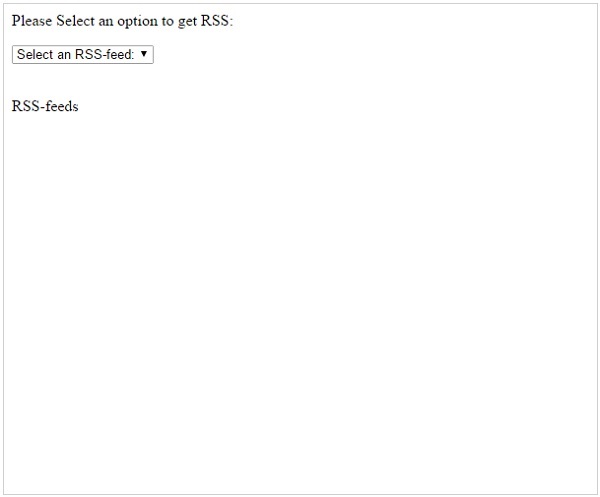PHP - Exemple de flux RSS Ajax
RSS
Really Simple Syndication est utilisé pour publier des informations souvent mises à jour à partir d'un site Web comme l'audio, la vidéo, les images, etc. Nous pouvons intégrer des flux RSS à un site Web en utilisant Ajax et php. Ce code montre comment afficher les flux RSS sur notre site.
Index.html
La page d'index doit être comme suit -
<html>
<head>
<script>
function showRSS(str) {
if (str.length == 0) {
document.getElementById("output").innerHTML = "";
return;
}
if (window.XMLHttpRequest) {
xmlhttp = new XMLHttpRequest();
}else {
xmlhttp = new ActiveXObject("Microsoft.XMLHTTP");
}
xmlhttp.onreadystatechange = function() {
if (xmlhttp.readyState == 4 && xmlhttp.status == 200) {
document.getElementById("output").innerHTML = xmlhttp.responseText;
}
}
xmlhttp.open("GET","rss.php?q="+str,true);
xmlhttp.send();
}
</script>
</head>
<body>
<p>Please Select an option to get RSS:</p>
<form>
<select onchange = "showRSS(this.value)">
<option value = "">Select an RSS-feed:</option>
<option value = "cnn">CNN</option>
<option value = "bbc">BBC News</option>
<option value = "pc">PC World</option>
</select>
</form>
<br>
<div id = "output">RSS-feeds</div>
</body>
</html>rss.php
rss.php contient une syntaxe expliquant comment accéder aux flux rss et renvoyer les flux rss aux pages Web.
<?php
$q = $_GET["q"];
if($q == "cnn") {
$xml = ("http://rss.cnn.com/rss/cnn_topstories.rss");
}elseif($q == "bbc") {
$xml = ("http://newsrss.bbc.co.uk/rss/newsonline_world_edition/americas/rss.xml");
}elseif($q = "pcw"){
$xml = ("http://www.pcworld.com/index.rss");
}
$xmlDoc = new DOMDocument();
$xmlDoc->load($xml);
$channel = $xmlDoc->getElementsByTagName('channel')->item(0);
$channel_title = $channel->getElementsByTagName('title')
->item(0)->childNodes->item(0)->nodeValue;
$channel_link = $channel->getElementsByTagName('link')
->item(0)->childNodes->item(0)->nodeValue;
$channel_desc = $channel->getElementsByTagName('description')
->item(0)->childNodes->item(0)->nodeValue;
echo("<p><a href = '" . $channel_link . "'>" .
$channel_title . "</a>");
echo("<br>");
echo($channel_desc . "</p>");
$x = $xmlDoc->getElementsByTagName('item');
for ($i = 0; $i<=2; $i++) {
$item_title = $x->item($i)->getElementsByTagName('title')
->item(0)->childNodes->item(0)->nodeValue;
$item_link = $x->item($i)->getElementsByTagName('link')
->item(0)->childNodes->item(0)->nodeValue;
$item_desc = $x->item($i)->getElementsByTagName('description')
->item(0)->childNodes->item(0)->nodeValue;
echo ("<p><a href = '" . $item_link . "'>" .
$item_title . "</a>");
echo ("<br>");
echo ($item_desc . "</p>");
}
?>Il produira le résultat suivant -
